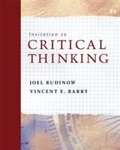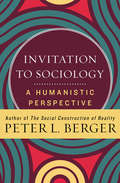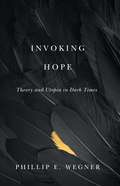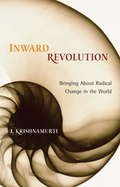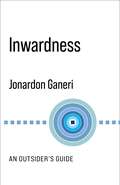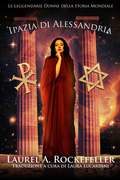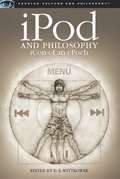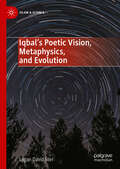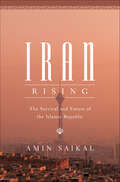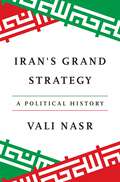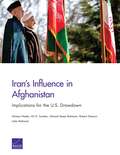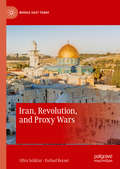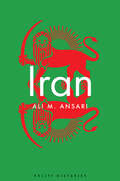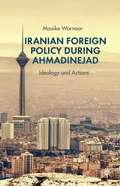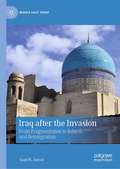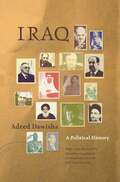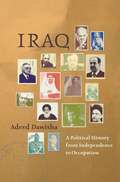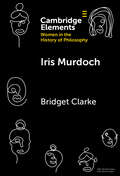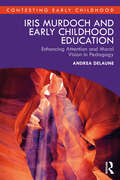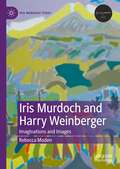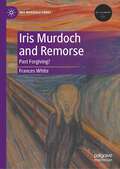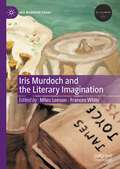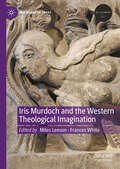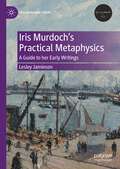- Table View
- List View
Invitation to Critical Thinking (6th edition)
by Vincent E. Barry Joel RudinowShedding outdated material in this update of the 2004 edition, Rudinow (Santa Rosa Junior College) and Barry (Bakersfield College, California) present material for students who already think critically and for those who need to learn how to do so. In an approach exemplified by dialog boxes, they introduce defining terms and issues (e. g. , whether there is room for creativity in critical thinking), the functions of language, and types of reasoning. Chapters include writing assignments, other exercises with an answer key, Internet search tips, and a glossary of key terms. Auxiliary instructional materials are available on a companion Website. Annotation ©2007 Book News, Inc. , Portland, OR (booknews. com)
Invitation to Sociology: A Humanistic Perspective
by Peter L. BergerThe most popularly read, adapted, anthologized, and incorporated primer on sociology ever written for modern readers Acclaimed scholar and sociologist Peter L. Berger lays the groundwork for a clear understanding of sociology in his straightforward introduction to the field, much loved by students, professors, and general readers. Berger aligns sociology in the humanist tradition—revealing its relationship to the humanities and philosophy—and establishes its importance in thinking critically about the modern world. Throughout, Berger presents the contributions of some of the most important sociologists of the time, including Max Weber, Émile Durkheim, Vilfredo Pareto, and Thorstein Veblen.
Invoking Hope: Theory and Utopia in Dark Times
by Phillip E. WegnerAn appeal for the importance of theory, utopia, and close consideration of our contemporary dark times What does any particular theory allow us to do? What is the value of doing so? And who benefits? In Invoking Hope, Phillip E. Wegner argues for the undiminished importance of the practices of theory, utopia, and a deep and critical reading of our current situation of what Bertolt Brecht refers to as finsteren Zeiten, or dark times.Invoking Hope was written in response to three events that occurred in 2016: the five hundredth anniversary of the publication of Thomas More&’s Utopia; the one hundredth anniversary of the founding text in theory, Ferdinand de Saussure&’s Course in General Linguistics; and the rise of the right-wing populism that culminated in the election of Donald Trump. Wegner offers original readings of major interventions in theory alongside dazzling utopian imaginaries developed from classical Greece to our global present—from Theodor Adorno, Ernst Bloch, Alain Badiou, Jacques Derrida, Fredric Jameson, Sarah Ahmed, Susan Buck-Morss, and Jacques Lacan to such works as Plato&’s Republic, W. E. B. Du Bois&’s John Brown, Isak Dinesen&’s &“Babette&’s Feast,&” Kim Stanley Robinson&’s 2312, and more. Wegner comments on an expansive array of modernist and contemporary literature, film, theory, and popular culture.With Invoking Hope, Wegner provides an innovative lens for considering the rise of right-wing populism and the current crisis in democracy. He discusses challenges in the humanities and higher education and develops strategies of creative critical reading and hope against the grain of current trends in scholarship.
Inward Revolution: Bringing About Radical Change in the World
by Jiddu KrishnamurtiJ. Krishnamurti was one of the most influential and widely known spiritual teachers of the twentieth century. Here, he inquires with the reader into how remembering and dwelling on past events, both pleasurable and painful, give us a false sense of continuity, causing us to suffer. His instruction is to be attentive and clear in our perceptions and to meet the challenges of life directly in each new moment.
Inwardness: An Outsider's Guide (No Limits)
by Jonardon GaneriWhere do we look when we look inward? In what sort of space does our inner life take place? Augustine said that to turn inward is to find oneself in a library of memories, while the Indian Buddhist tradition holds that we are self-illuminating beings casting light onto a world of shadows. And a disquieting set of dissenters has claimed that inwardness is merely an illusion—or, worse, a deceit.Jonardon Ganeri explores philosophical reflections from many of the world’s intellectual cultures, ancient and modern, on how each of us inhabits an inner world. In brief and lively chapters, he ranges across an unexpected assortment of diverse thinkers: Buddhist, Hindu, Islamic, Chinese, and Western philosophy and literature from the Upaniṣads, Socrates, and Avicenna to Borges, Simone Weil, and Rashōmon. Ganeri examines the various metaphors that have been employed to explain interiority—shadows and mirrors, masks and disguises, rooms and enclosed spaces—as well as the interfaces and boundaries between inner and outer worlds. Written in a cosmopolitan spirit, this book is a thought-provoking consideration of the value—or peril—of turning one’s gaze inward for all readers who have sought to map the geography of the mind.
Ipazia di Alessandria
by Laurel A. Rockefeller Traduzione a cura di Laura LucardiniMentre il mondo occidentale cadeva nell'oscurità, lei ebbe il coraggio di difendere la Luce. Nata nel 355 d.C, dopo il regno di Costantino, Ipazia di Alessandria visse il declino dell'Impero Romano, in un mondo in cui l'obbedienza alle autorità religiose era più importante della scienza e dove la ragione e la logica erano viste come una minaccia per il nuovo ordine mondiale. Era il mondo precedente al Medioevo, un mondo impegnato a decidere il rapporto tra scienza e religione, libertà e ortodossia, tolleranza e odio. Per più di 40 anni Ipazia visse al confine tra gli anni bui e la luce della filosofia classica, delle arti e delle scienze. Sebbene nessuno dei suoi libri sia sopravvissuto ai feroci roghi del fanatismo religioso, Ipazia rimane una delle scienziate più importanti di tutti i tempi. Questa è la sua affascinante storia. Include bibliografia, cronologia dettagliata e coordinate di latitudine e longitudine delle principali città dell'Impero romano per consentire al lettore di esplorare le meraviglie celesti con Ipazia.
Ipod and Philosophy: Icon of an Epoch
by Dylan E. WittkowerNineteen readings examine the social impact of this popular mobile digital device. Approaching hearing as a social act and technology from a Marxist perspective, Wittkower (philosophy, Coastal Carolina U.) asks questions about the relationship between the music we hear via the iPod, the artist, the "i" (self), and iPublic. Other contributors approach the iPod as creating a familiarity in a Wittgensteinian sense, as a new venue for philosophy audiobooks, and as a tool of white dominance, community, or isolation.
Iqbal’s Poetic Vision, Metaphysics, and Evolution (Islam & Science)
by Logan David SilerThis book explores Muhammad Iqbal&’s poetic vision of a universe in a state of becoming, and, by putting this vision in conversation with contemporary metaphysical models, articulates the contribution Iqbal&’s vision makes to discussions about Islamic theology, philosophy, and science. To do so, the book articulates Iqbal&’s critique of the Islamic tradition and distinguishes his system from classical Islamic thought while also highlighting his positive influences in this regard (Al-Biruni, Suhrawardi, etc). It explores features of Iqbal&’s vision in light of contemporary metaphysical models by emphasizing three key elements of his thought—metaphysics of becoming, panentheism and panpsychism. While locating Iqbal within the spectrum of these particular schools of thought, Logan David Siler discusses the strengths of his position, and reveals the relevance of his thought to the religion and science conversation—particularly in the realm of evolutionary biology. It is these realms of thought that articulate the most formidable challenges to the theistic view. Yet, Iqbal offers a vision which provides a means to challenge the more metaphysical claims of scientism. Additionally, Siler critiques the shortcomings of Iqbal's vision and offers suggestions for how to improve it.
Iran Rising: The Survival and Future of the Islamic Republic
by Amin SaikalAn authoritative account of how and why the Islamic Republic has survived to become a critical player in the Middle East and the worldWhen Iranians overthrew their monarchy, rejecting a pro-Western shah in favor of an Islamic regime, many observers predicted that revolutionary turmoil would paralyze the country for decades to come. Yet forty years after the 1978–79 revolution, Iran has emerged as a critical player in the Middle East and the wider world, as demonstrated in part by the 2015 international nuclear agreement. In Iran Rising, renowned Iran specialist Amin Saikal describes how the country has managed to survive despite ongoing domestic struggles, Western sanctions, and countless other serious challenges.Saikal explores Iran’s recent history, beginning with the revolution, which set in motion a number of developments, including war with Iraq, precarious relations with Arab neighbors, and hostilities with Israel and the United States. He highlights the regime’s agility as it navigated a complex relationship with Afghanistan during the Soviet invasion, survived the Gulf wars, and handled fallout from the Iraqi and Syrian crises. Such success, Saikal maintains, stems from a distinctive political order, comprising both a supreme Islamic leader and an elected president and national assembly, which can fuse religious and nationalist assertiveness with pragmatic policy actions at home and abroad.But Iran’s accomplishments, including its nuclear development and ability to fight ISIS, have cost its people, who are desperately pressuring the ruling clerics for economic and social reforms—changes that might in turn influence the country’s foreign policy. Amid heightened global anxiety over alliances, terrorism, and nuclear threats, Iran Rising offers essential reading for understanding a country that, more than ever, is a force to watch.
Iran's Grand Strategy: A Political History
by Vali NasrFrom the New York Times bestselling author of The Shia RevivalA gripping account that overturns simplistic portrayals of Iran as a theocratic pariah state, revealing how its strategic moves on the world stage are driven by two pervasive threats—external aggression and internal dissolutionIran presents one of the most significant foreign policy challenges for America and the West, yet very little is known about what the country&’s goals really are. Vali Nasr examines Iran&’s political history in new ways to explain its actions and ambitions on the world stage, showing how, behind the veneer of theocracy and Islamic ideology, today&’s Iran is pursuing a grand strategy aimed at securing the country internally and asserting its place in the region and the world.Drawing on memoirs, oral histories, and original in-depth interviews with Iranian decision makers, Nasr brings to light facts and events in Iran&’s political history that have been overlooked until now. He traces the roots of Iran&’s strategic outlook to its experiences over the past four decades of war with Iraq in the 1980s and the subsequent American containment of Iran, invasion of Iraq in 2003, and posture toward Iran thereafter. Nasr reveals how these experiences have shaped a geopolitical outlook driven by pervasive fear of America and its plans for the Middle East.Challenging the notion that Iran&’s foreign policy simply reflects its revolutionary values or theocratic government, Iran&’s Grand Strategy provides invaluable new insights into what Iran wants and why, explaining the country&’s resistance to the United States, its nuclear ambitions, and its pursuit of influence and proxies across the Middle East.
Iran's Influence in Afghanistan: Implications for the U.S. Drawdown
by Robert Stewart Alireza Nader Ali G. Scotten Ahmad Idrees Rahmani Leila MahnadThis study explores Iranian influence in Afghanistan and the implications for the United States after most U. S. forces depart Afghanistan in 2016. Iran has substantial economic, political, cultural, and religious leverage in Afghanistan. Although Iran will attempt to shape a post-2014 Afghanistan, Iran and the United States share core interests: to prevent the country from again becoming dominated by the Taliban and a safe haven for al Qaeda.
Iran, Revolution, and Proxy Wars (Middle East Today)
by Ofira Seliktar Farhad RezaeiThis book analyzes the historical quest of the Islamic Republic of Iran to export its revolution to the Muslim countries in the Middle East and beyond. The authors argue that Iran exported its revolution by using proxies such as Hezbollah, the Iraqi Shite militias, and the Houthis. The study unravels the casual chain behind less-known cases of Iranian sponsorship of al Qaeda (Central) and al Qaida in Iraq. It combines rigorous theory with detailed empirical analysis which can add to the current debate about ways to roll back Iran’s revolutionary export.
Iran: The Politics Of Confrontation (Polity Histories)
by Ali M. AnsariBoth revolutionary and reactionary, the Islamic Republic of Iran has long been a conundrum for Western observers. A theocracy that aspires to a popular mandate; an anti-colonial state with imperial pretensions of its own: modern Iran is in many ways a reflection of its struggle to reconcile its traditions with the challenges of modernity. In this book, Ali Ansari takes readers on a journey through Iran’s turbulent history. Beginning with the country’s fall from grace as a Great Power in the nineteenth century, he explores its repeated attempts to modernize in a series of revolutionary movements from the Constitutional Revolution of 1906 to the Islamic Revolution of 1979 and the civil unrest that is breaking out today. In so doing, he reveals how the experience of history and Iran’s encounter with ‘modernity’ have come to define it – and set it on an authoritarian path in confrontation with the West and, often, its own people.
Iranian Foreign Policy During Ahmadinejad
by Maaike WarnaarWritten for scholars and practitioners puzzled by Iran's foreign policy choices, this book argues that Iran's foreign policy behavior is best understood in the context of the regime's foreign policy ideology, which is rooted in a conception of Iran as a nation changed by the 1979 Revolution and an example to other nations in a changing world.
Iraq after the Invasion: From Fragmentation to Rebirth and Reintegration (Middle East Today)
by Saad N. JawadThis book states that one calamitous result of the invasion and occupation of Iraq (2003) was the dismantling of the state and the destruction of all the structures and processes of government. The invading powers, the USA and UK, were obsessed with the removal of the regime of Saddam Hussein, which they regarded a clear danger and a serious threat to their strategies designs and in the region. To justify their atrocity, they trumped up a number of falsehoods and charges, such as the issue of WMD. Before that and over a period of 13 years, they had imposed unprecedented, fierce and relentless sanctions on the country. These sanctions not only impoverished and aggrieved the people of Iraq, but also instilled and deeply etched a sense of pessimistic impassivity among many Iraqis in that they felt no longer cared whatever the future might hold for them. The regime’s totalitarian nature also helped in creating this attitude. To add insult to injury, the provisional US-installed administration passed many resolutions which have had catastrophic consequences, such as the total dissolution of the security and armed forces and the de-baathification law. The hurriedly contrived new constitution confounded the situation even further and negatively impacted the integrity of the state. Exploiting the inconclusiveness and ambiguities contained in it, the Iraqi Kurdish Region became a de facto independent entity. In time, the central government became weaker than the regions. The hardest hit in this chaotic state of affairs was national unity. The sectarian and ethnic quota-based policies followed by the occupying forces and the expatriate Iraqis who came along with them dealt successive blows to the laws and institutions of the land which further disintegrated the Iraqi state. Iraq now is in dire need of national reconciliation programme aimed at re-uniting the people and the country.
Iraq: A Political History
by Adeed DawishaWith each day that passed after the 2003 invasion, the United States seemed to sink deeper in the treacherous quicksand of Iraq's social discord, floundering in the face of deep ethno-sectarian divisions that have impeded the creation of a viable state and the molding of a unified Iraqi identity. Yet as Adeed Dawisha shows in this superb political history, the story of a fragile and socially fractured Iraq did not begin with the American-led invasion--it is as old as Iraq itself. Dawisha traces the history of the Iraqi state from its inception in 1921 following the collapse of the Ottoman Empire and up to the present day. He demonstrates how from the very beginning Iraq's ruling elites sought to unify this ethnically diverse and politically explosive society by developing state governance, fostering democratic institutions, and forging a national identity. Dawisha, who was born and raised in Iraq, gives rare insight into this culturally rich but chronically divided nation, drawing on a wealth of Arabic and Western sources to describe the fortunes and calamities of a state that was assembled by the British in the wake of World War I and which today faces what may be the most serious threat to survival that it has ever known. Featuring Dawisha's insightful new afterword on recent political developments, Iraq is required reading for anyone seeking to make sense of what's going on in Iraq today, and why it has been so difficult to create a viable government there.
Iraq: A Political History from Independence to Occupation
by Adeed DawishaWith each day that passed after the 2003 invasion, the United States seemed to sink deeper in the treacherous quicksand of Iraq's social discord, floundering in the face of deep ethno-sectarian divisions that have impeded the creation of a viable state and the molding of a unified Iraqi identity. Yet as Adeed Dawisha shows in this superb political history, the story of a fragile and socially fractured Iraq did not begin with the invasion--it is as old as Iraq itself. Dawisha traces the history of the Iraqi state from its inception in 1921 following the collapse of the Ottoman Empire and up to the present day. He demonstrates how from the very beginning Iraq's ruling elites sought to unify this ethnically diverse and politically explosive society by developing state governance, fostering democratic institutions, and forging a national identity. Dawisha, who was born and raised in Iraq, gives rare insight into this culturally rich but chronically divided nation, drawing on a wealth of Arabic and Western sources to describe the fortunes and calamities of a state that was assembled by the British in the wake of World War I and which today faces what may be the most serious threat to survival that it has ever known. Iraq is required reading for anyone seeking to make sense of what's going on in Iraq today, and why it has been so difficult to create a viable government there.
Iris Murdoch (Elements on Women in the History of Philosophy)
by Bridget ClarkeIris Murdoch is well-known for her moral philosophy, especially for the light it sheds on the inner life. This Element focuses on the political significance and contours of Murdoch's ethics. Its chief aim is to illuminate the affinities between Murdoch's concept of the individual and the Enlightenment ideal of a society in which people live together as free equals. There are five sections in this Element. Section 1 provides context for the discussion. Section 2 compares what Murdoch calls the liberal and naturalistic outlooks and argues that she develops a modified version of the naturalistic outlook to better support an Enlightenment sensibility. Sections 3 and 4 examine the three main features of Murdoch's 'naturalized' individual. Section 3 considers the individual's uniqueness and transcendence. Section 4 considers the individual's knowability through love. Section 5 offers some concluding remarks.
Iris Murdoch and Early Childhood Education: Enhancing Attention and Moral Vision in Pedagogy (Contesting Early Childhood)
by Andrea DelauneWhat relevance does the philosophy of Iris Murdoch have to offer to our understanding of early childhood education? In Iris Murdoch and Early Childhood Education, Andrea Delaune establishes the importance of attention, moral imagination, and moral vision for early childhood pedagogy. The book challenges limited behaviouristic or technicist views of education to assert teaching as a richly imaginative undertaking built from the slow and incremental practice of attention.Early childhood teaching can be enriched by Murdoch’s central philosophical question, How can we make ourselves better?, which does not prompt a uniform or hegemonic ideal practice and instead invites us to appreciate the ‘little peering efforts’ of the moral imagination to build a more expansive, comprehensive, and pedagogically impactful approach to educational practice. Drawing extensively on Murdoch’s philosophy, this insightful book provides a hopeful, practical, and accessible vision for change in the everyday pedagogy of early childhood educators and educationalists. Through the lens of love and justice, Delaune shows how teachers and educationalists can extend their moral vision of early childhood education through a broad examination of topics such as intentional teaching, neuroscience, and affection. The text promotes and explains the practicalities of attention as a reflective tool for reappraising both practice and simplistic understandings of early childhood education.By addressing central tenets of education that have remained topical throughout history, such as ethics in education, teacher-child relationships, and the role of the teacher, this book will resonate with a wide range of individuals. Delaune presents critical examinations of policy, pedagogy, and values for teaching, as well as practical examples of attention in action that will be of interest to teachers and educationalists alike. The text will be particularly relevant to those engaged in the study of early childhood education, including both those pursuing initial teacher education and currently working in the field.
Iris Murdoch and Harry Weinberger: Imaginations and Images (Iris Murdoch Today)
by Rebecca ModenThe novelist and philosopher Iris Murdoch and the painter Harry Weinberger engaged in over twenty years of close friendship and intellectual discourse, centred on sustained discussion of the practice, teaching and morality of art. This book presents a reappraisal of Murdoch’s novels – chiefly, three mature novels, The Sea, The Sea (1978), Nuns and Soldiers (1980) and The Good Apprentice (1985), and two enigmatic late novels, The Green Knight (1993) and Jackson’s Dilemma (1995) – which are perceived through the prism of her discourse with Weinberger. It draws on a run of almost 400 letters from Murdoch to Weinberger, and on Murdoch’s philosophical writings, Weinberger’s private writings, the remarks of both artists in interviews, and other material relating to their views on art and art history, much of which is unpublished and has received no previous critical attention. Scrutiny of their shared values, methods and the imagistic dialogue that takes place in their art provides original perspectives on Murdoch’s creativity, and new ways of understanding her experimentation with the visual arts. This book offers a new line of enquiry into Murdoch's novels, and into the relationship between literature and the visual arts.
Iris Murdoch and Remorse: Past Forgiving? (Iris Murdoch Today)
by Frances WhiteThis exploration of the crucially important role played by remorse in Iris Murdoch’s philosophical, theological, and political thinking identifies it as a critical concept in her moral psychology and a recurrent theme in her art. Through engagement with Simone Weil, current theories of remorse, trauma theory and Holocaust studies, it offers fresh perspectives on Murdoch’s fiction – particularly the late novels, her radio play The One Alone, and her monograph Heidegger.
Iris Murdoch and the Literary Imagination (Iris Murdoch Today)
by Miles Leeson Frances WhiteThis volume is the third volume in Palgrave' Macmillan's new Iris Murdoch Today scholarly series.Iris Murdoch and the Literary Imagination is the first major collection of literary essays since her centenary in 2019. It brings together leading Murdoch scholars from across the world who expand the boundaries of recent criticism offering work not only on the novels, but on her unpublished poetry and archival materials. This collection discusses her interest in, and use of, Japanese literature; her relationship with, and reader-response to her, in Australia; Murdoch in the post #metoo era; her lifelong interest in the supernatural, same-sex relationships and friendships; as well as the use and abuse of biographical material. The collection widens the field of Murdoch studies and marks a new waypoint in the development of her critical reception.
Iris Murdoch and the Western Theological Imagination (Iris Murdoch Today)
by Miles Leeson Frances WhiteScholarly interest in theological aspects of Murdoch’s fiction and philosophy took off slowly. It was thirty years after her writing debut that the first work taking detailed notice of the theological language deployed by this overtly-atheist author appeared, and it was a further decade before theologians began to engage with Murdoch’s work together. But it was not until the twenty-first century that this aspect of Murdoch’s thought and imagination began to receive sustained attention. This collection seeks to build on this foundation, begun forty years ago, and to expand the work in this area of Murdoch studies which has lately been gathering momentum. This project consolidates earlier discussion of the vital part theology plays in Murdoch’s thought, and then takes the debate in new directions. Contributors include a wide range of current Murdoch scholars from diverse disciplines who develop debate about this subject in a variety of innovative and fruitful ways, to inspire future works in this area of Murdoch studies.
Iris Murdoch, Gender and Philosophy
by Sabina LovibondIris Murdoch was one of the best-known philosophers and novelists of the post-war period. In this book, Sabina Lovibond explores the tangled issue of Murdoch's stance towards gender and feminism, drawing upon the evidence of her fiction, philosophy, and other public statements. As well as analysing Murdoch's own attitudes, Iris Murdoch, Gender and Philosophy is also a critical enquiry into the way we picture intellectual, and especially philosophical, activity. Appealing to the idea of a 'social imaginary' within which Murdoch's work is located, Lovibond examines the sense of incongruity or dissonance that may still affect our image of a woman philosopher, even where egalitarian views officially hold sway. The first thorough exploration of Murdoch and gender, Iris Murdoch, Gender and Philosophy is a fresh contribution to debates in feminist philosophy and gender studies, and essential reading for anyone interested in Murdoch's literary and philosophical writing.
Iris Murdoch’s Practical Metaphysics: A Guide to her Early Writings (Iris Murdoch Today)
by Lesley JamiesonThis book explores Iris Murdoch as a philosopher who, through her distinctive methodology, exploits the advantages of having a mind on the borders of literature and politics in her early career writings (pre-The Sovereignty of Good). By focusing on a single decade of Murdoch’s early career, Jamieson tracks connections between her views on the state of literature and politics in postwar Britain and her approach to the philosophy of mind and moral philosophy. Furthermore, this close study reveals that, far from a stylistic quirk, Murdoch’s use of metaphors, analogies, and other literary devices is internal to her methodology. Finally, rather than asking what Murdoch’s views are, this work will ask “what is Murdoch trying to achieve with her writings and public lectures, and how does she go about this?” By answering the latter question, we will have a new strategy for interpreting her writings more generally. The book contributes to the growing body of scholarship focusing on Iris Murdoch’s philosophical writings, and on women in the history of analytic philosophy.
